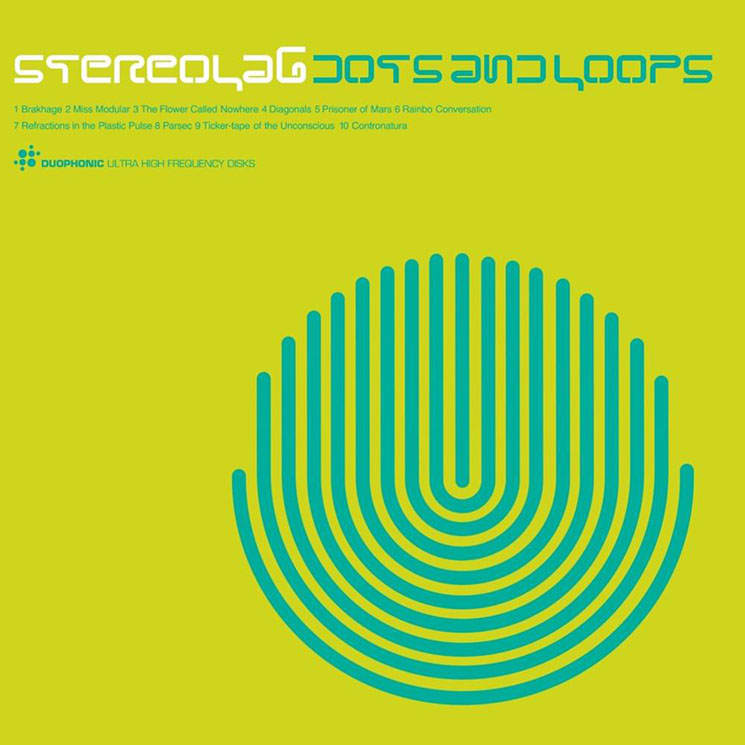Released just over a year after 1996's breakthrough, Emperor Tomato Ketchup, Stereolab's fifth studio album, Dots & Loops, encapsulated the London band's retro-futuristic vision they had been moving towards since their formation.
Dots & Loops shifted their attention towards rhythmic fluidity and maximalist experimentation, the by-product of fostering key alliances with contemporaries like Sean O'Hagan (High Llamas), who arranged the ornate strings, Andi Toma and Jan St. Werner (Mouse On Mars) and John McEntire (Tortoise, the Sea & Cake), who had engineered Emperor Tomato Ketchup.
Once again the bulk of the album was recorded at Idful Music Corporation with McEntire. The percussionist extraordinaire basically served as the seventh member, leaving his fingerprints all over the seven tracks he contributed to. Both "Brakhage" and "Diagonals," with their fluttering vibraphone and jazz-y time signatures, sound as much like Tortoise as they do Stereolab.
But they would also break new ground as a unit, venturing deeper into electronic music's unknown. The wobbling, patched together rhythm of "Ticker-Tape of the Unconscious" was every bit as inventive as anything issued on Warp Records that year. "Parsec," which was later licensed to sell the new VW Beetle, flirted with manic drum & bass timing without any real disorientation.
The remaining tracks were taken to Düsseldorf, where they worked with Toma and Werner, who added subtle textures to the sublime '60s pop waltz "The Flower Called Nowhere," but really stamp their mark on the closing, nine-minute "Contronatura," which mutates from a lulling duet between Laetitia Sadier and Mary Hansen into a gurgling disco sendoff.
Perhaps on the strength of its euphoric yé-yé throwback, "Miss Modular," Dots & Loops would become Stereolab's most commercially successful release to date. The album's ability to balance accessible melodies with innovative new ideas (see the five-part, 17-minute-plus "Refractions in the Plastic Pulse") and socialist lyrics sung in two languages made it a refreshing anomaly, especially in the UK where Oasis and Blur, not to mention Spice Girls, were still dominating the charts.
But alongside Radiohead's OK Computer and Spiritualized's Ladies and Gentlemen We Are Floating In Space, Dots & Loops helped usher in a new wave of British music, even getting name-dropped in the discussion of a new sound emerging from the underground at the time, dubbed post-rock.
Now reissued as an expanded edition, remastered from the original half-inch tapes, Dots & Loops arrives with a bonus disc of alternate takes, four-track demos and instrumentals. None of the extras are all that essential. There are no previously released B-sides or remixes, however, there is some fascination to be had in hearing how, for example, the epic "Refractions in the Plastic Pulse" began as a two-minute demo.
Still, it's the thrill of having this album sounding better than ever that matters most.
(Warp / Duophonic UHF Disks)Dots & Loops shifted their attention towards rhythmic fluidity and maximalist experimentation, the by-product of fostering key alliances with contemporaries like Sean O'Hagan (High Llamas), who arranged the ornate strings, Andi Toma and Jan St. Werner (Mouse On Mars) and John McEntire (Tortoise, the Sea & Cake), who had engineered Emperor Tomato Ketchup.
Once again the bulk of the album was recorded at Idful Music Corporation with McEntire. The percussionist extraordinaire basically served as the seventh member, leaving his fingerprints all over the seven tracks he contributed to. Both "Brakhage" and "Diagonals," with their fluttering vibraphone and jazz-y time signatures, sound as much like Tortoise as they do Stereolab.
But they would also break new ground as a unit, venturing deeper into electronic music's unknown. The wobbling, patched together rhythm of "Ticker-Tape of the Unconscious" was every bit as inventive as anything issued on Warp Records that year. "Parsec," which was later licensed to sell the new VW Beetle, flirted with manic drum & bass timing without any real disorientation.
The remaining tracks were taken to Düsseldorf, where they worked with Toma and Werner, who added subtle textures to the sublime '60s pop waltz "The Flower Called Nowhere," but really stamp their mark on the closing, nine-minute "Contronatura," which mutates from a lulling duet between Laetitia Sadier and Mary Hansen into a gurgling disco sendoff.
Perhaps on the strength of its euphoric yé-yé throwback, "Miss Modular," Dots & Loops would become Stereolab's most commercially successful release to date. The album's ability to balance accessible melodies with innovative new ideas (see the five-part, 17-minute-plus "Refractions in the Plastic Pulse") and socialist lyrics sung in two languages made it a refreshing anomaly, especially in the UK where Oasis and Blur, not to mention Spice Girls, were still dominating the charts.
But alongside Radiohead's OK Computer and Spiritualized's Ladies and Gentlemen We Are Floating In Space, Dots & Loops helped usher in a new wave of British music, even getting name-dropped in the discussion of a new sound emerging from the underground at the time, dubbed post-rock.
Now reissued as an expanded edition, remastered from the original half-inch tapes, Dots & Loops arrives with a bonus disc of alternate takes, four-track demos and instrumentals. None of the extras are all that essential. There are no previously released B-sides or remixes, however, there is some fascination to be had in hearing how, for example, the epic "Refractions in the Plastic Pulse" began as a two-minute demo.
Still, it's the thrill of having this album sounding better than ever that matters most.
